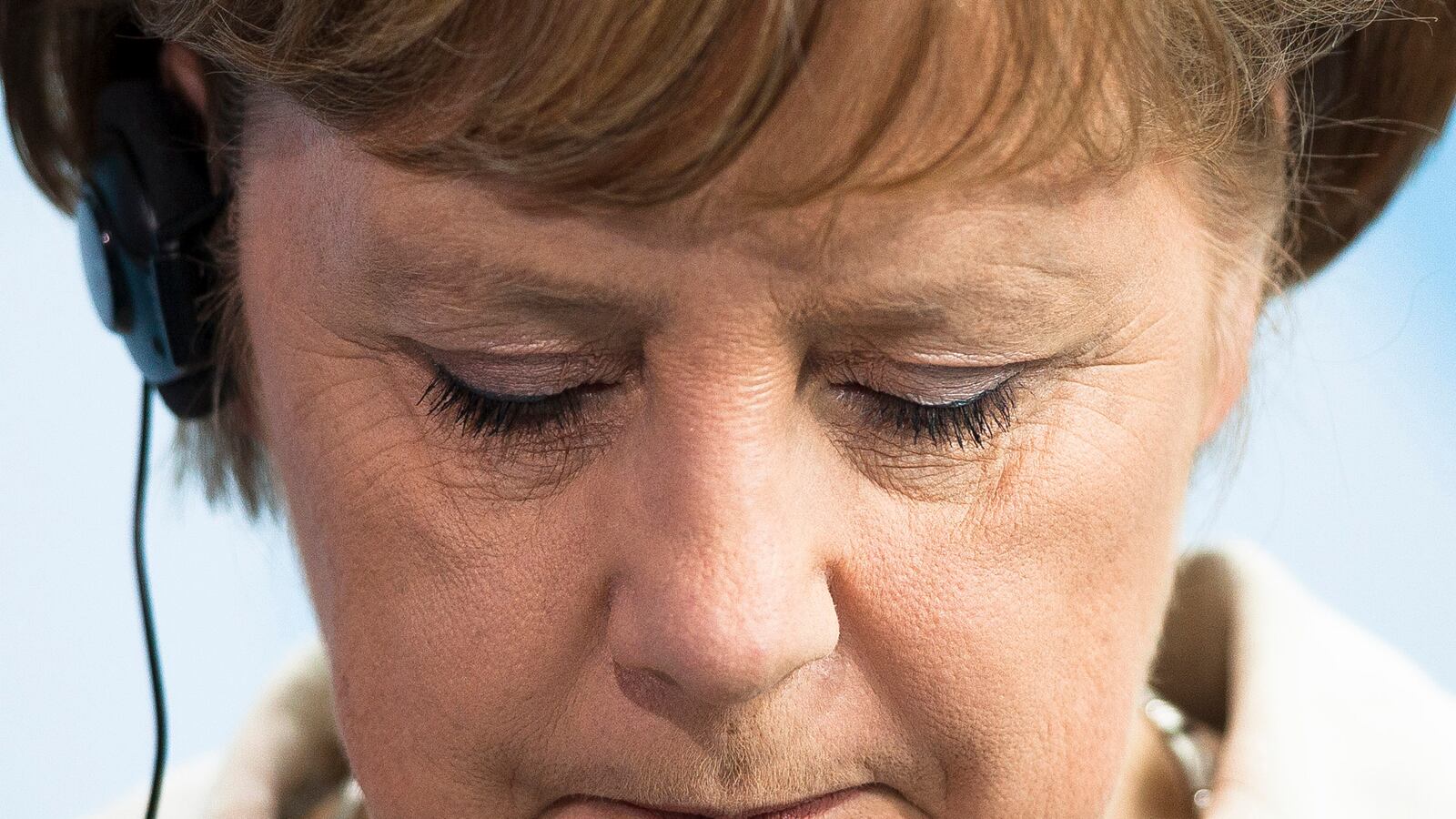A Greek, an Irishman, and a Portuguese go into a bar and order a drink. Who picks up the bill? A German.
When the joke was first cracked at the start of the euro-zone crisis in 2009, it raised a wry smile. But with the adjustments needed to bring it up to date, it’s a lot less funny.
Spain has joined the drinkers—with a vast and seemingly unquenchable thirst that makes the original Greek ouzo guzzlers seem lightweight. Meanwhile Germany, the only one of the 17 members with a wallet worth having, is refusing to foot the tab.
The result is that Spain, the euro-zone’s fourth biggest economy, is reeling precariously, posing a serious threat to itself and others at the bar. Meanwhile Europe, America, and Asia, and all the financial markets in between, are living in the disruptive shadow of an escalating bar brawl.
This week Barack Obama and David Cameron said they’d had enough. Over the telephone on Tuesday night, the leaders had agreed that Germany must decide whether to pay up or kick out the drinkers. “They need to take measures to ensure a strong and successful currency. It’s make up or break up time,” a Downing Street spokesman said.
For once, Berlin and Brussels appeared to react: officials said resources were being mustered to inject as much as $100 billion into Spain’s stricken banking sector in a bid to lift the enormous pressure on Madrid and stabilize financial markets. The figure is twice the size of the $50 billion that Madrid reckons is needed to recapitalize its banks—but still probably too small.

Fresh troubles are emerging daily in Spain: property prices are plunging, pushing up the bad loans. Banks, which helped fuel Spain’s huge real estate boom, are now thought to have 800,000 unsold properties on their books.
Madrid, in an effort to stand behind its banks, is being engulfed. On Thursday, Fitch said that due to a “dramatic erosion” of Spain’s economic and financial outlook, it now reckoned Madrid needs to find $125 billion to bail out its banks, rather than $37 billion it projected six months ago. Analysts at JPMorgan Chase say it’s more like $437 billion.
Meanwhile the smaller economy of Greece is, as ever, causing more than its fair share of trouble. On June 17, Greeks, who go to the polls to vote on whether to return to the drachma, once again hold the integrity of the euro project in their hands. Even if they vote yes, Prime Minister Lucas Papademos has said that within days of the poll, Athens risks having a cash shortfall of $1.25 billion.
And then there are frequent ominous belches from Italy, Ireland, Portugal, and France. Even Germany’s powerhouse economy is showing signs of stress: fresh data show exports fell for the first time this year.
Yet the political response has been woeful. Over three years, there have been 19 summits, billions of euros in bailouts, and even a new treaty, yet the crisis is still advancing.
In a highly critical report last week, Fitch said: “The absence of a credible vision of a reformed [monetary union] and financial firewall has rendered Spain and other so-called peripheral nations vulnerable to capital flight and undercut their access to affordable fiscal funding.”
One key advancement is that it’s clear that problem is far more fundamental than debt: it’s political, cultural, and structural, too. Other monetary unions—like the United States or United Kingdom—work because the richer and more productive parts agree, unconditionally and without fuss, to support and pay for the poor parts.
When the financial crisis hit, the U.S. unleashed a $700 billion TARP fund for banks across the states; Britain injected $1.5 trillion into its banks, the biggest of which were the Royal Bank of Scotland and Halifax Bank of Scotland.
The euro zone has tried its own brand of shock and awe, but it has been unconvincing, in size and philosophy. The austerity demands attached to the Greek and Portuguese bailouts have turned them into poison chalices; the ECB’s $1.25 trillion cheap loan program is a poor alternative to a lender of last resort; the bailout funds, the EFSF and ESM, are too far from being collective debt issuance, or eurobonds, to reassure any investor.
European leaders have pinned their hopes on wealthy foreign investors, swooping in to buy eurozone sovereign. This week, one of the biggest, the China Investment Corporation, made its position clear: “Europe hasn’t got the right policies in place,” CIC’s chairman, Lou Jiwei, told reporters. “There is a risk that the euro zone may fall apart and that risk is rising.”
Last week Warren Buffett said: “The [euro zone] can’t have a common currency but not common fiscal policy or culture. It can’t be half slave and half free. European leaders need to resolve some of the union’s weaknesses.”
In other words, as George Osborne said, Germany must give in to the “remorseless logic” of a fiscal union—or simply give up on the project altogether.
The breakup of the euro would be traumatic, particularly for the states involved. In Greece, the most likely to depart first, experts have warned of mass bank nationalization; business bankruptcies; and a devaluation of savings and pensions by as much as 50 percent. The impact on financial markets is likely to be less dramatic, as most banks and traders have been preparing for the eventuality for months.
For her part, Chancellor Angela Merkel has vowed to keep the union together.
Which brings us full circle: Germany must accept that restoring and maintaining the eurozone comes with costs, both financial and cultural. The Greek and Italian governments have vowed to clamp down on tax fraud and reform their generous public sectors and Spain has promised to clean up its banks.




